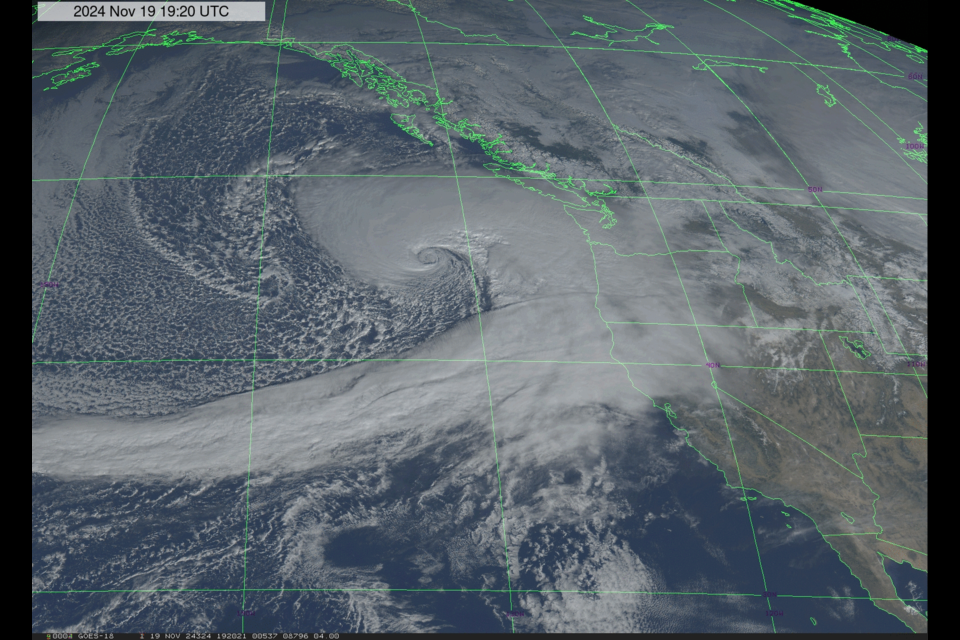A significant wind storm is expected to arrive in southern B.C. this afternoon, Nov. 19, bringing wind speeds of 90 km/h to the Salish Sea and gusts of up to 70 km/h to much of Metro Vancouver.
And it's going to be a long one.
The high winds are expected to last 18 to 24 hours starting Tuesday night (Nov. 19) according to Environment Canada meteorologist Brian Proctor, much longer than the typical wind storm in Vancouver.
"Right now its probable centre is 400 to 500 km west of the mouth of the Columbia River," he tells V.I.A.
"It's tracking northwards."
Once it arrives, the west coast of Â鶹´«Ã½Ó³»Island will be hit first and hardest, especially Tofino, according to Proctor.
Closer to Vancouver, the open waters of the Georgia Strait, Salish Sea and Howe Sound will experience the highest wind speeds of 90 km/h. Metro Â鶹´«Ã½Ó³»will see gusts of 70 km/h, even in inland areas, starting tonight and lasting through most of Wednesday.
The high winds will likely cause power outages; in light of that, the Â鶹´«Ã½Ó³»Police Department (VPD) is reminding people how to deal with intersections where traffic lights have gone out.
There’s a storm with high winds headed our way this evening, and power outages are expected. For anyone needing a refresher on what to do if the traffic lights stop working, the BC Ministry of Transportation and Infrastructure has got you covered:
— Â鶹´«Ã½Ó³»Police (@VancouverPD)
Image…
The Province of B.C. for people who want to prepare for the storm, and BC Ferries has already .
The City of Â鶹´«Ã½Ó³»has for tonight, as well.
An unusual storm
It's an unusual storm, the meteorologist notes, as it's coming to the Lower Mainland from the south. Due to its path, the stormiest weather will last longer in Â鶹´«Ã½Ó³»than typical wind storms.
"It's going to be a long-duration wind event," says Proctor. "We're looking at something that's going to be 18 to 24 hours in duration of the strongest winds."
At the same time, it's intensifying quickly. In a process called "bombogenesis," the pressure in the storm has dropped dramatically, causing wind speeds to quicken. In this case, it's due to a cold air mass that also caused the hail and lightning over Metro Â鶹´«Ã½Ó³»this weekend.
"The cold air is what's providing a lot of the energy for the storm," says Proctor.
That means wind speeds will peak at around 120 km/h over the surface of the ocean west of B.C. Luckily for Vancouver, the city won't get hit by the top-speed gusts.
"We're somewhat fortunate that it's further to the west; it would be a horrible day to be out at sea on the west side of Â鶹´«Ã½Ó³»Island," says Proctor.
Southern B.C. hasn't experienced a bomb cyclone since 2021 when two hit over the stormy fall. While the 2021 atmospheric river event followed, Proctor says the different weather events were unrelated, and there's no reason to believe a similar atmospheric river is in the forecast.
He notes that these types of storms are often part of a La Niña weather cycle, which is developing now.
"This is the time of year we tend to see these explosive storms," he adds.
The peak of the storm should leave the area late on Wednesday, and things will be unstable but less dramatic for a couple of days. A more typical November storm is due in Metro Â鶹´«Ã½Ó³»on Nov. 22, coming down the coast from the north as they normally do. Heavier than usual rain and wind are expected.
"There'll be decent winds but won't be a bomb cyclone," says Proctor.



